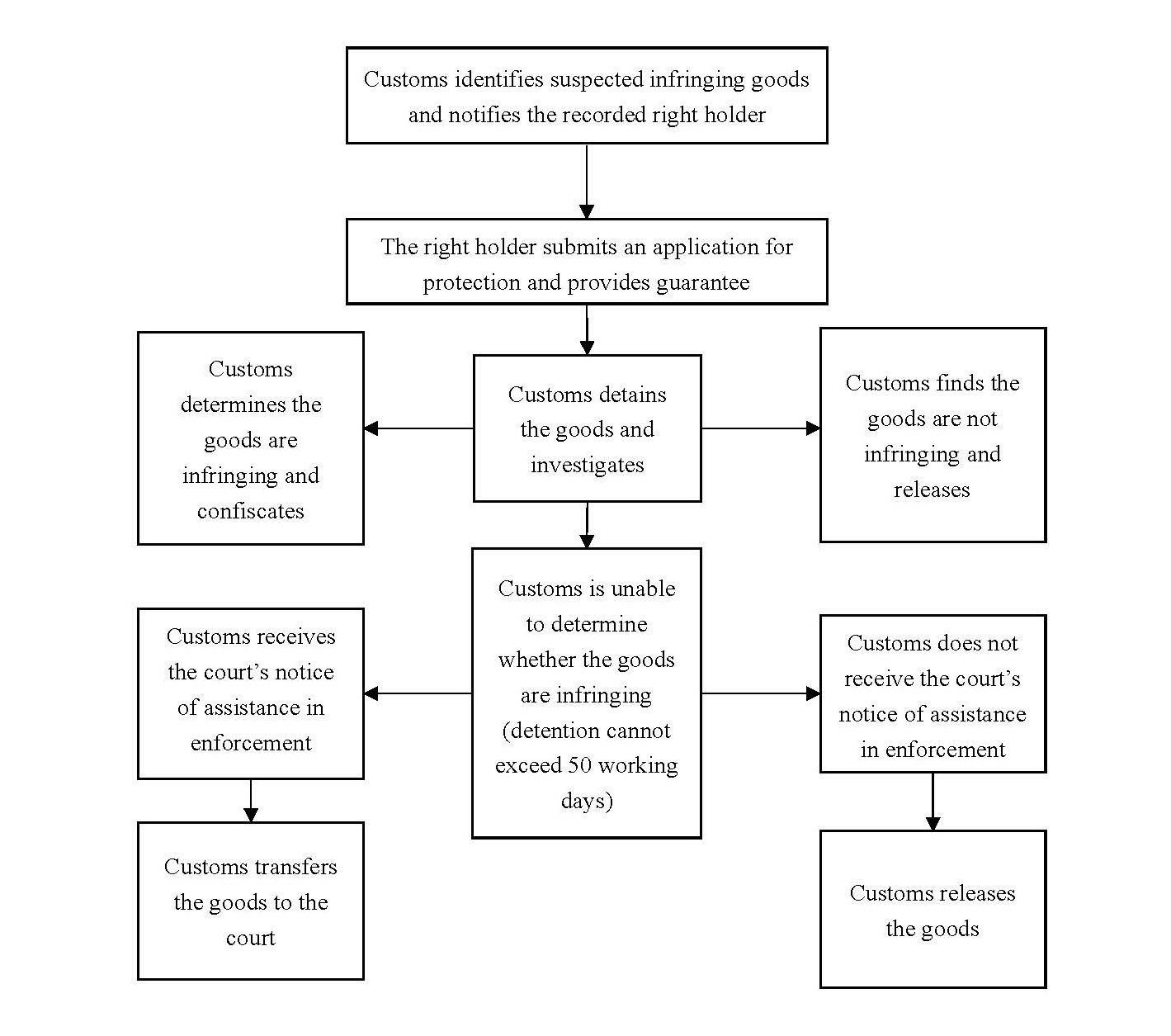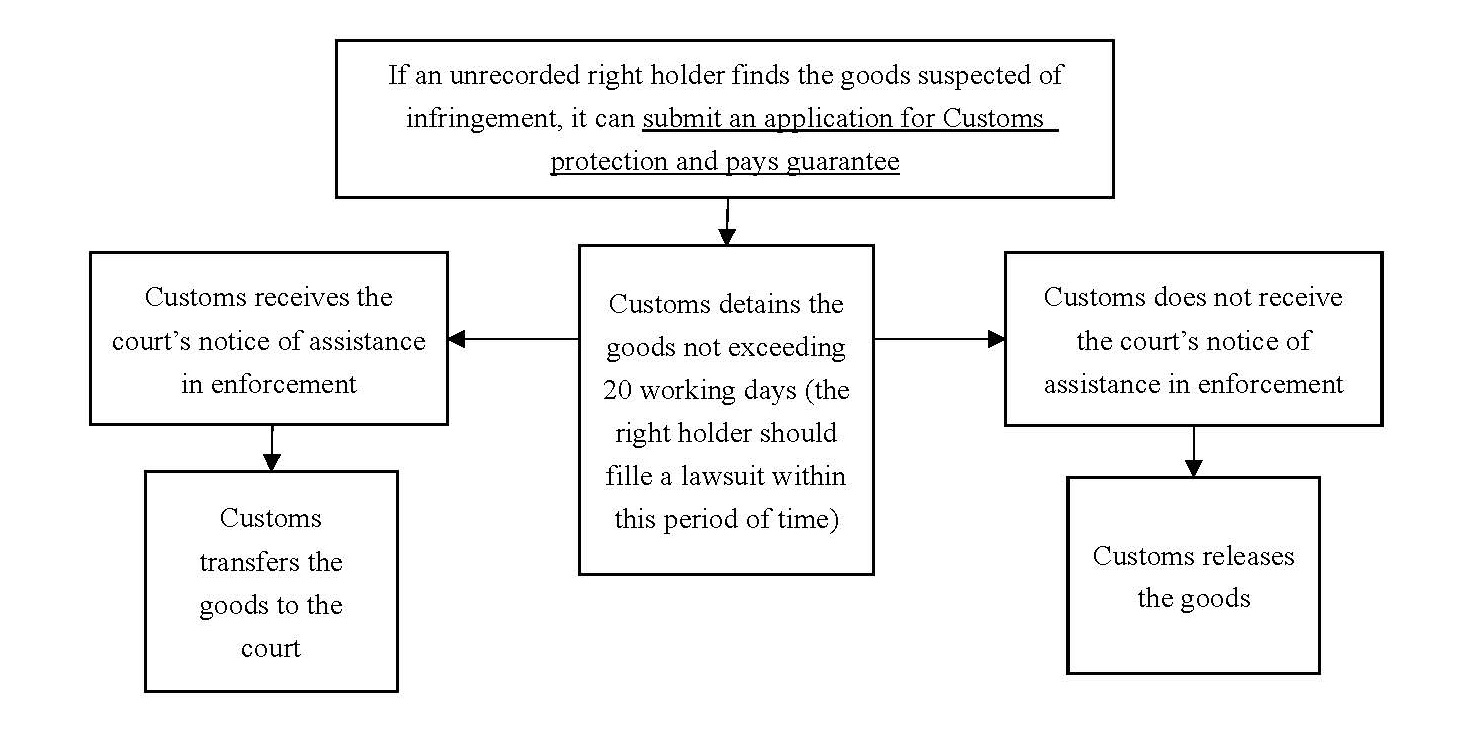Customs Border IP Protection in China -- Procedures and Key Measures
We previously introduced the system and current implementation of China’s Customs IP enforcement.[1] In this second part of the article, we will discuss the procedures and the key measures which may lead to effective IP enforcement at Chinese Customs.
Chinese Customs procedures for IPR protection are divided into two types: (1) investigation and handling ex officio and (2) detention upon request. According to the press briefing held by the General Administration of Customs on the World Intellectual Property Day 2021, Chinese Customs in 2020 conducted investigation and handling ex officio against 1,232 batches of goods (39,837,400 units of infringing goods) through the freight channels and conducted detention upon request against 39 batches of goods (498,800 units of infringing goods). Thus, between these two types of IPR protection procedures, investigation and handling according to authority is the main measure for Customs to implement IPR protection.
If a right holder has recorded its IPR with the General Administration of Customs and the validity of the recordation has not expired, Customs will take the initiative to identify the imported and exported goods suspected of infringing the recorded IPR in routine inspection and will notify the right holder if any suspected infringing goods are found. After the right holder submits the protection application and guarantee, Customs will detain the suspected infringing goods, investigate, and determine whether the goods are infringing the recorded IPR. If Customs determines the goods are infringing, it will confiscate the infringing goods and impose fines against infringers.
The main procedure of the proactive protection is illustrated as below:

It is worth noting that if a right holder has obtained certain clues of suspected infringement, it may forward the information to Customs, and Customs will initiate investigation and handling by its authority.
(2) Passive protection: detention upon request
If a right holder does not record its IPR with Customs for protection, it may still request Customs protection. Specifically, if a right holder who does not record its IPR for Customs protection finds the goods to be imported or exported are suspected of infringing its IPR, it may submit an application to Customs at the place where the goods enter or leave the country for detaining the suspected infringing goods. However, if Customs does not initiate any investigation or dealing with the requested infringement matter, the right holder should file a lawsuit with the people's court within 20 working days and request the court to issue a temporary injunction order, so Customs may seize the infringing goods and transfer the goods to the court as evidence.

Accordingly, if requesting passive protection, the right holder needs to provide certain infringement evidence to Customs while Customs only will temporarily detain the suspected goods no more than 20 working days. Nevertheless, the right holder will be able to use this opportunity to inspect the suspected goods, take photos, and collect samples as well as other evidence which may be helpful to prove infringement or damages in the subsequent court proceedings.
Comparing to the proactive protection as administrative IPR enforcement, the passive protection at Customs is more like a measure to assist the right holder in facilitating the subsequent judicial enforcement.
IV. Key Measures to Customs Protection: Record Your IPR with Chinese Customs
According to the press briefing of the General Administration of Customs, a total of 15,163 applications for recording of IP rights have been approved so far. In 2020, 4,263 enterprises newly recorded their IPRs for Customs protection, including 2,710 local enterprises and 1,553 foreign enterprises.
Because Customs implements random sample inspections and there are countless commodities passing through Customs every day, the probability of infringing products being identified by Customs may not be high. However, it is still of certain practical significance to record IPR for Customs protection.
As discussed above, IPR recordation with Customs plays a substantial role in IP enforcement. Recording IPR with Customs is a prerequisite for Customs to initiate the proactive protection procedure. Only under the proactive protection procedure, Customs has authority and obligation to determine whether the detained goods are infringing and further take compulsory measures, such as confiscation and imposing fines. Additionally, in the proactive protection procedure, the suspected goods may be detained for up to 50 working days (the passive protection only has 20 working days). The guarantee required by Customs from the right holder to launch the administrative enforcement has a maximum limit of RMB 100,000 (the passive protection requires the guarantee equivalent to the value of the goods to be detained).
Therefore, significance of IPR recordation with Customs lies not only in Customs’ identification of infringing products, but also in giving the right holder stronger protection measures and more convenience to enforce its IP rights. In contrast, the passive protection is used mostly as an evidence preservation measure before the court proceedings and lacks substantive effect of IPR protection (such as ex officio investigation, fast decision-making and punishment against infringers).
The process for IPR recordation with Customs in China is very simple. A right holder only needs to submit an application along with some supporting documents required by the General Administration of Customs, and no official fee will be charged. Generally, the approval decision of IPR recordation can be received within 30 days. The recordation comes into force from the date of approval and is valid for 10 years. The IPR holder may renewal the IPR recordation before the expiration date, and the period of validity of each renewed recordation is 10 years.
At present, only owners of Chinese trademarks (excluding service trademarks), patents (including inventions, utility models and design patents) and copyrights may apply for IPR recordation. For a foreign right holder, it needs to apply for IPR recordation with Customs through their local office in China or by entrusting a domestic agent, which could be any individual or organization in China.




